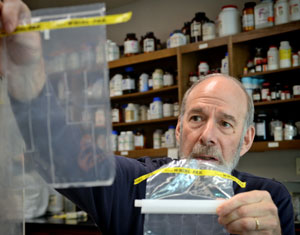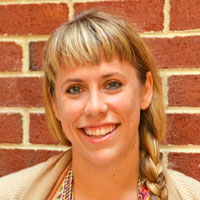ESE student team awarded EPA’s ‘People, Prosperity and the Planet’ grant
February 29, 2016
A team of students working with Mark Sobsey, PhD, Kenan Distinguished Professor of environmental sciences and engineering (ESE) at the UNC Gillings School of Global Public Health, has received a $14,569 grant from the U.S. Environmental Protection Agency (EPA) to develop and evaluate a new test to detect cholera bacteria in drinking water in low-resource and disaster settings.
The team, which includes master’s student Kathleen (Katy) Brown and undergraduate Megan Lott, is one of 38 student groups across the country that were awarded a People, Prosperity and the Planet (P3) grant on Feb. 16 to develop new and sustainable public health products or strategies.
“This year’s P3 teams have created innovative research projects that tackle some of our most pressing environmental and public health challenges,” said Thomas A. Burke, PhD, EPA’s science adviser and deputy assistant administrator of EPA’s Office of Research and Development, in an EPA release announcing the awards. “These students have the opportunity to bring their exciting new ideas for innovation in sustainability to life, by expanding their learning experience beyond the classroom.”
The ESE students’ fully portable field test, which requires no electrical power, additional equipment or advanced training, is an adaptation of Sobsey’s Compartment Bag Test (CBT), which detects and quantifies E. coli in water. The new test will do the same for cholera bacteria in water.

Dr. Mark Sobsey describes his Compartment Bag Test, designed to detect and measure E. coli in water.
Cholera, an acute diarrheal illness caused by the bacterium Vibrio cholerae, affects between 3 million and 5 million people around the world each year, resulting in more than 100,000 deaths annually. The bacterium is found in water and food sources contaminated by the feces of an infected person, usually in places with poor sanitation and inadequate water treatment and hygiene.
“We are very excited to have this opportunity to develop a simple, portable field test to detect and quantify Vibrio cholerae in water, as it remains a global health threat for which we lack such methods for widespread use,” Sobsey said.
“This P3 grant is yet another example of the entrepreneurial spirit that runs through Professor Sobsey’s lab, including previous P3 grants,” said Michael Aitken, PhD, ESE professor and department chair. “He has been fortunate to attract students who are energized by the possibility of improving people’s lives through safe water and sanitation, and he has done a great job mentoring them.”
Of note: The P3-awarded student project is an expansion of research conducted by Sobsey through a Gillings Innovation Lab award. This month, Sobsey won another GIL award to develop a new water treatment technology to overcome waterborne viruses including rotaviruses, noroviruses and Hepatitis E and A. Learn more here.
Share
Gillings School of Global Public Health contact: David Pesci, director of communications, (919) 962-2600 or dpesci@unc.edu


